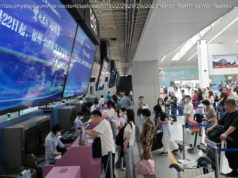Aerial photos show interlocking concrete blocks placed around edges of artificial island for protection appear to have drifted away
The mainland Chinese authority managing the multibillion-dollar mega bridge linking Hong Kong to Macau and Zhuhai has dismissed mounting safety concerns following the apparent collapse of a structure meant to protect an artificial island along the project’s main stretch.
The Hong Kong-Zhuhai-Macau Bridge Authority said the design was working as intended but local experts were not convinced by the explanation, warning of a catastrophic risk if an undersea tunnel connected to the island was washed away because of insufficient protection.
But the authority, comprising officials from the three governments, said the blocks, known as dolosse, were specially designed to be submerged in a “random manner”.
That was because the island was connected to a tunnel, and a concentration of dolosse would exert too much pressure on it.
The contractor built the project in strict accordance with the design, which had been thoroughly inspected and approved as meeting the required standards, the authority said in a statement.
But experts were not convinced, warning of a catastrophic risk of the underwater tunnel being swept away due to insufficient protection. If the dolosse were not protecting the island’s edges, waves in bad weather would damage the sea wall, they noted.
Structural engineer Ngai Hok-yan said he had reservations about the authority’s explanation, and questioned whether there was sufficient protection with just one layer of dolosse at the tunnel’s connection point.
“Our standard practice is to use at least two layers of dolosse to serve as a protective zone,” he explained. “Also, each dolos used only weighs five tonnes compared with 25 tonnes each for those used at Hong Kong’s High Island Reservoir. It seems to me protection for the artificial island is insufficient.”
“The tunnel can be detached and float above the sea with cracks and water seepage. In that case, it will be game over for the tunnel and the bridge, too.”
Ngai added the Hong Kong government had a responsibility to seek clarifications from the authority to ensure the entire project met safety standards.
Veteran engineer Albert Lai Kwong-tak likewise called the authority’s explanations “unreasonable”.
Even if there was a need to randomly distribute the dolosse, Lai added, the area should be smaller.
“The affected area should be similar in width to the tunnel,” which the engineer said was about 20 metres.
He said the artificial island could have sunk.
“It could be a problem of uneven settlement of the artificial island,” he added, noting that if that was the case, the tunnel could be at risk. However, he believed the island was not immediately at risk.
Hong Kong has so far committed to contributing about HK$10.7 billion (US$1.38 billion), or 43 per cent, of the main bridge’s construction cost. However, local officials will also end up spending another HK$110 billion to build the city’s connection to the main bridge.
The Highways Department said it would keep communicating with the authority and monitor the main bridge works to ensure that “its quality meets the relevant requirements”.






